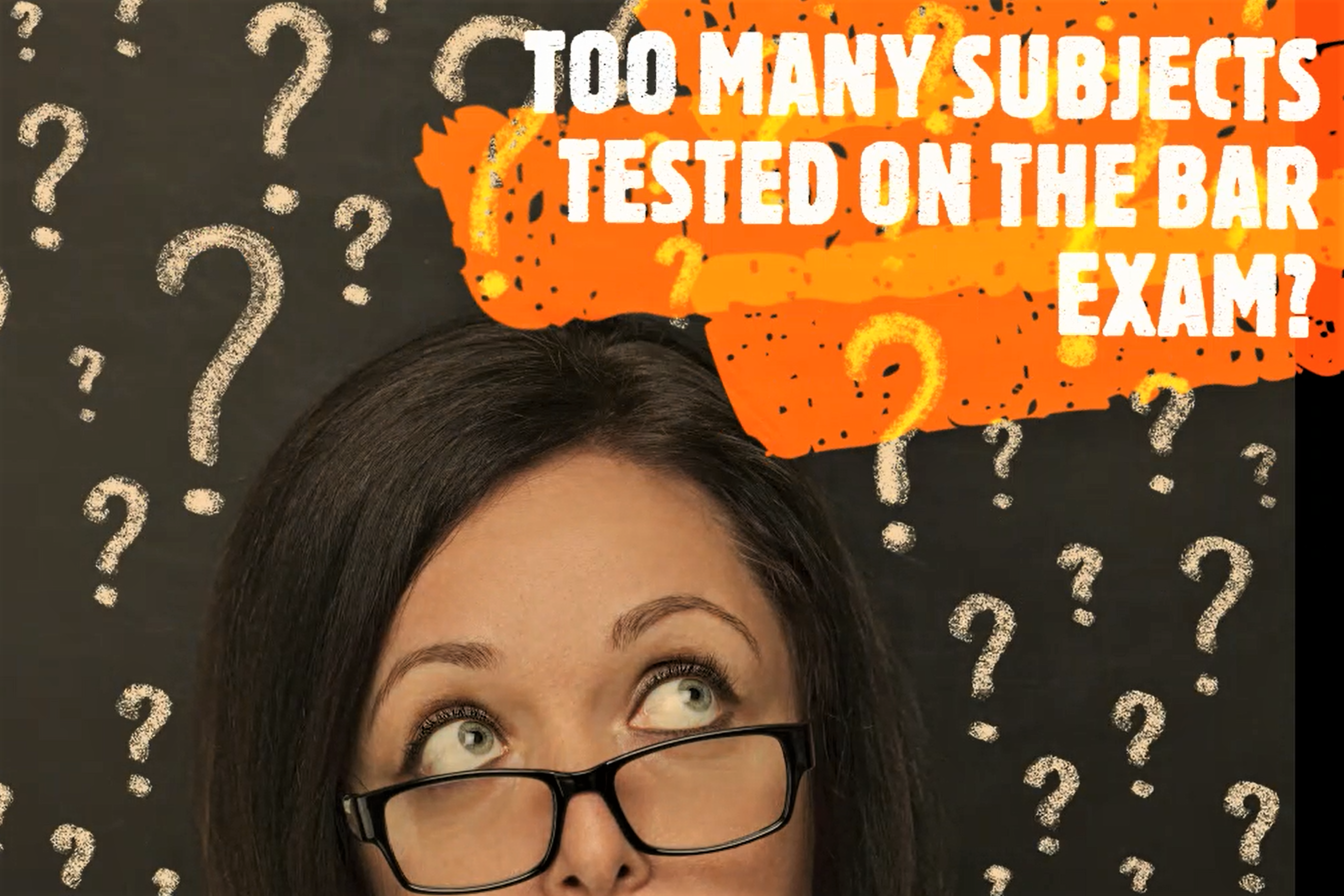
Social-distancing policies have forced states to rethink the July bar exam. One state has decided to shorten it to one day. Another is going open-book. A third is eliminating the multiple-choice portion and using short-answer questions instead. All three plan to administer their exams remotely (on-line). ABAJournal.com has the story. And now Michigan has decided to go with a one-day, on-line, all-essay test in July.
Here’s an idea: in the process of revising the bar exam, jurisdictions should also consider reducing the number of subjects tested.
How many subjects should be tested on the bar exam to establish minimum competence to enter the practice of law? Two recent court-appointed study groups have tackled that question—and have reached similar conclusions.
Too Many Subjects?
A draft report from a California state bar working group recommends cutting bar-exam essay topics from the present 13 (in California) to 8. The purpose is to de-emphasize memorization while establishing a core set of minimum competencies. Testing fewer subjects would place more emphasis on the fundamental skills of issue-spotting and legal analysis. (The Practice of Law in California: Findings from the California Attorney Practice Analysis and Implications for the California Bar Exam (April 20, 2020)).
Earlier, an Indiana study commission made a similar recommendation, for a different reason. It expressed concern that the sheer volume of subjects essay-tested in Indiana (18) could result in “cognitive overload” for applicants and place them at a disadvantage to applicants in a majority of states. It urged that Indiana adopt the Uniform Bar Exam (UBE), which tests 12 subjects, but also that Indiana should reduce bar-exam subjects from 18 to 12 regardless. (Report of the Study Commission on the Future of the Indiana Bar Exam: Findings and Recommendations (12/11/2019)).
The National Conference of Bar Examiners, sponsor of the UBE, thinks that testing 12 subjects ensures minimum competence to enter law practice. The Indiana study agrees. The California state bar thinks that eight are enough. In Michigan, Board of Law Examiners Rule 3(A)(2) lists 16 essay-tested subjects. The best thinking of those who have studied the topic say that’s too many. If so, what subjects should Michigan jettison?
What Subjects To Cut?
If Michigan were to adopt the UBE—which I have advocated and the Indiana study recommends—that would reduce the number to 12, a 34% reduction. Following the California study’s recommendation would reduce the number even more: by 50%.
The UBE subjects are Business Associations, Civil Procedure, Conflict of Laws, Constitutional Law, Contracts, Criminal Law & Procedure, Evidence, Family Law, Real Property, Secured Transactions, Torts, and Trusts & Estates. Applying that model, Michigan should eliminate the following non-UBE subjects: Equity, Professional Responsibility, UCC Sales & Negotiable Instruments, and Workers Compensation. (Professional Responsibility is the subject of a separate examination.)
Based on over 16,000 responses to its survey on subjects that entry-level lawyers encounter in their practice, the California report recommends that the following subjects be retained: Civil Procedure, Constitutional Law, Contracts, Criminal Law & Procedure, Evidence, Real Property, and Torts. One subject would be added, Administrative Law. Applying the California recommendation, Michigan should also eliminate Conflict of Laws, Corporations, Creditor Rights, Family Law, and Wills & Trusts, and add Administrative Law.
What would be left? According to these recent studies, enough to assess minimum competence to practice law, based on what entry-level practitioners need to know, without overemphasizing memorization or generating cognitive overload. Sometimes fewer is better. If no appetite exists for UBE adoption, should Michigan at least re-examine the number of subjects tested?
Otto Stockmeyer is a Distinguished Professor Emeritus at Cooley Law School. Although retired from classroom teaching, he retains an active interest in helping law students succeed. His views do not necessarily reflect those of Cooley Law School. His previous blog postings are archived at info.cooley.edu/blog/author/otto-stockmeyer.



